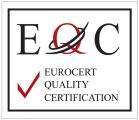“The Kosher certification” is a process in which food is certified according to the religious laws of Judaism. The Hebrew word “kosher” means “suitable” or “appropriate”. To monitor compliance with Jewish dietary laws, rabbis or other qualified individuals perform the Kosher certification. While beef and poultry can be kosher, pork and shellfish are not kosher unless they are slaughtered and prepared according to specific rules.
The Kosher certification is typically achieved through several steps, including a review of ingredients, manufacturing processes, and production facilities by a rabbi or team of rabbis. Once a company meets all requirements, the product is certified as kosher and marked with a Kosher seal.
Although Kosher certification is optional, many companies choose to do so to make their products accessible to a wider audience and to show that they meet the highest standards of Kashrut.
For Jewish consumers, adherence to dietary laws is of great importance to ensure that their food conforms to religious regulations. Manufacturers must meet certain standards to receive Kosher certification, such as using kosher ingredients and complying with rules for slaughter, equipment, and facility cleaning. Even non-Jews can buy kosher food, as they are often seen as more hygienic and healthier.
Kosher foods include meat from animals that have been slaughtered according to Jewish laws, fish with scales and fins, dairy products from kosher animals, as well as fruits, vegetables, nuts, seeds, and grain products made from kosher ingredients.
“The Kosher certification” is a process in which food is certified according to the religious laws of Judaism. The Hebrew word “kosher” means “suitable” or “appropriate”. To monitor compliance with Jewish dietary laws, rabbis or other qualified individuals perform the Kosher certification. While beef and poultry can be kosher, pork and shellfish are not kosher unless they are slaughtered and prepared according to specific rules.
The Kosher certification is typically achieved through several steps, including a review of ingredients, manufacturing processes, and production facilities by a rabbi or team of rabbis. Once a company meets all requirements, the product is certified as kosher and marked with a Kosher seal.
Although Kosher certification is optional, many companies choose to do so to make their products accessible to a wider audience and to show that they meet the highest standards of Kashrut.
For Jewish consumers, adherence to dietary laws is of great importance to ensure that their food conforms to religious regulations. Manufacturers must meet certain standards to receive Kosher certification, such as using kosher ingredients and complying with rules for slaughter, equipment, and facility cleaning. Even non-Jews can buy kosher food, as they are often seen as more hygienic and healthier.
Kosher foods include meat from animals that have been slaughtered according to Jewish laws, fish with scales and fins, dairy products from kosher animals, as well as fruits, vegetables, nuts, seeds, and grain products made from kosher ingredients.


